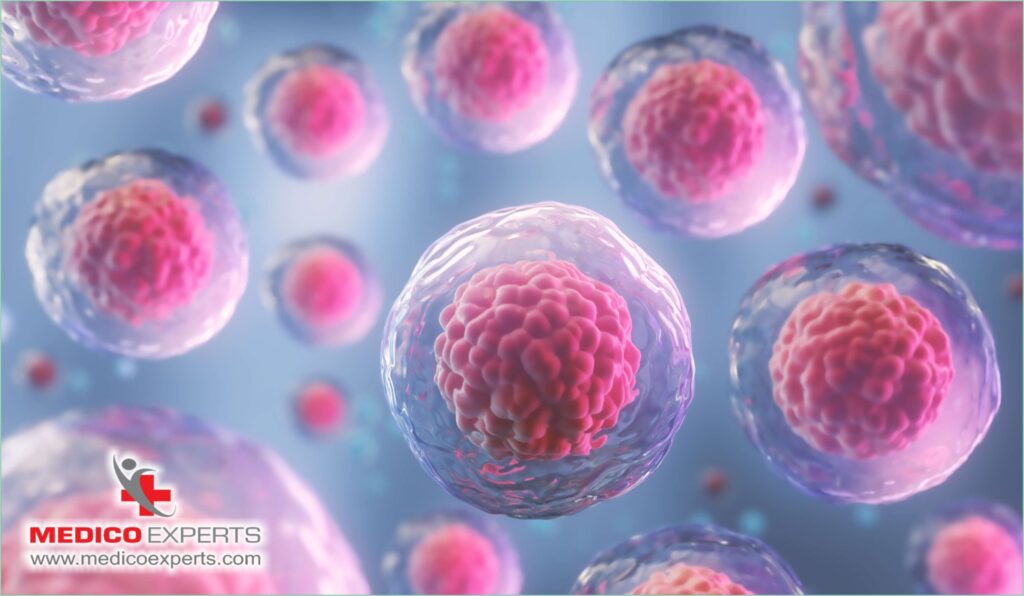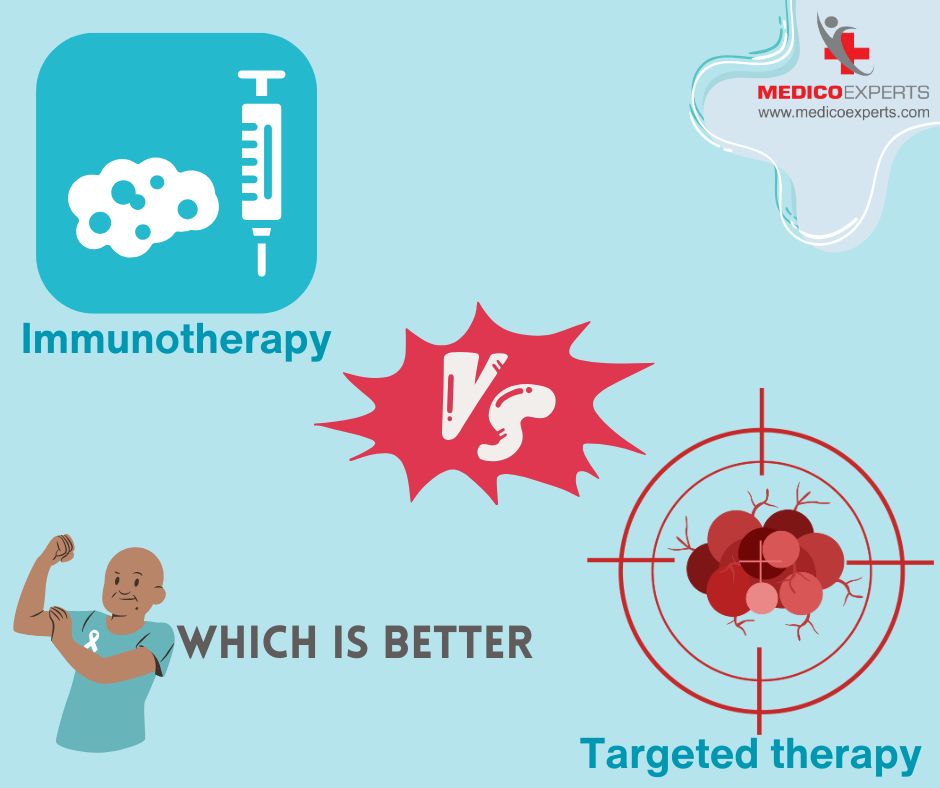Which is better immunotherapy or targeted therapy?
It may be difficult for you to decide which one of these treatments is a better option for cancer treatment.
It is natural to feel overwhelmed by the information available on the internet. Understanding the difference between immunotherapy and targeted therapy will help you get rid of the confusion and make the right decision.
In this blog, we break down the advantages, disadvantages, and side effects of these two therapies. By the end of it, you will have a clearer picture of which therapy will suit you or your dear one.
Key Takeaways
- Immunotherapy and targeted therapy fight cancer in different ways.
- Immunotherapy uses your immune system to target cancer cells. Checkpoint inhibitors can stop cancer cells from evading immune detection.
- Targeted therapy focuses on specific mutations in cancer cells. By aiming only on abnormal cells, it saves the healthy cells from damage.
- Immunotherapy could be effective when other treatments aren’t. It may lower recurrence risk. It may also reduce the side effects of treatment.
- Targeted therapy can improve survival rates. It has fewer side effects than chemotherapy.
- Proactive steps, like reporting symptoms early and lifestyle changes, can help manage side effects from both therapies effectively.
- The decision of which one you should opt for depends on several factors.
Which is Better Immunotherapy or Targeted Therapy?

Immunotherapy uses your body’s immune system to fight cancer cells. It does so by stimulating the immune system. Different treatment methods are used in this therapy. Each of them is tailored to work better for certain types of cancers.
Researchers have found some differences within cancer cells that help them grow. Targeted therapy uses drugs that focus on these differences within the cancer cell. They do not attack the healthy cells during the process. Immunotherapy and targeted therapy can be used alone or in combination with other cancer treatments.
You need to learn how they work, their benefits, side effects, and what type of diseases these therapies treat. Knowing immunotherapy and targeted therapy better will tell which therapy is best for you and most effective.
| Aspect | Immunotherapy | Targeted Therapy |
| Definition | Uses your body’s immune system to fight cancer cells by stimulating it to recognize and attack them. | Uses drugs that target specific differences within cancer cells that enable them to grow and spare healthy cells. |
| Mechanism | Stimulates your immune system to recognize and destroy cancer cells | Focuses on targeting molecular differences in cancer cells to disrupt growth or kill the cells. |
| Approach | Uses different treatment methods tailored for specific types of cancers | Uses drugs that inhibit growth signals or pathways specific to cancer cells, often avoiding healthy cells. |
| Selectivity | May have a broader effect on the immune system, potentially affecting other parts of the body. | More precisely, aiming to target cancer cells specifically, resulting in fewer impacts on healthy cells. |
| Combination with Other Treatments | Can be used alone or with other treatments like chemotherapy or targeted therapy | Can be used alone or with other treatments like chemotherapy or immunotherapy. |
| Cancer Types Treated | Effective for a range of cancers; specific types depend on the immunotherapy approach used. | Typically used for cancers with specific genetic mutations or molecular markers. |
How Does Immunotherapy Work?

Immunotherapy is used in cancer as it helps your immune system recognize cancer cells. For instance, immune checkpoint inhibitors stop certain proteins from turning off T cells, allowing them to destroy cancer cells.
Checkpoint inhibitors are a type of immunotherapy. Your immune system has “checkpoints”. These checkpoints are proteins on immune cells (like T cells) that help prevent the immune system from attacking healthy cells. Cancer cells can trick these checkpoints by sending signals to T cells not to attack them.
Immunotherapy is also used in autoimmune diseases. Autoimmune diseases can damage your immune system. Examples of it are multiple sclerosis (MS) and rheumatoid arthritis (RA). Different types of immunotherapies are checkpoint inhibitors, monoclonal antibodies, vaccines, and cellular immunotherapy.
It is used to treat bladder cancer, head and neck cancer, kidney cancer, lung cancer, melanoma, leukemia, lymphoma, liver cancer, stomach cancer, and uterine cancer. It is also used to treat autoimmune diseases like myasthenia gravis, Graves’ disease, pemphigus vulgaris, type I diabetes, multiple sclerosis, and uveitis.
To learn more about immunotherapy check our blog on the same: https://www.medicoexperts.com/immunotherapy-in-india/
How Does Targeted Therapy Work?

As said above, researchers have found some differences within cancer cells. Targeted therapy drugs target these differences. It alters the inner workings of the cells by focusing on the parts that make them different from the normal cells.
Simply put, targeted therapy drugs hinder the signals that tell cancer cells to grow and divide. They can kill cancer cells or starve them of hormones.
Targeted therapy can be done with the help of pills and injections. It also can be administered intravenously. It is used to treat brain cancer, breast cancer, gastrointestinal (GI) cancers, head and neck cancer, kidney cancer, leukemia, mesothelioma, melanoma, thyroid cancer, prostate cancer, and lung cancer.
To know more about targeted therapy, check our blog on the same: https://www.medicoexperts.com/targeted-therapy/
Benefits of Immunotherapy & Side Effects

Understanding the benefits and side effects will help you choose between the two therapies. So here are the benefits of immunotherapy:
- Immunotherapy may work when all other treatments have failed to give you relief from the symptoms of cancer and autoimmune diseases.
- It has fewer side effects because it only focuses on your immune system and not other cells of your body.
- It can make other treatments like chemotherapy more effective.
- It lowers the chances of cancer recurrence. Immunotherapy trains your immune system to go after the cancer cells if they ever come back.
Some side effects of immunotherapy are:
- The area in your body where immunotherapy medicine goes may go sore, hurt, itch, or turn red.
- You may have fever and chills
- You may feel fatigued
- There can be weight gain due to fluid retention
- There can be heart palpitations
- You may have a Stuffy head
- There can be diarrhoea
Benefits of Targeted Therapy & Side Effects

Here are some of the benefits of targeted therapy:
- The best part of targeted therapy is its precision. It only targets the cancer cells and not the healthy ones.
- The treatment can be more effective with it as it can be tailored to each patient’s cancer.
- Targeted therapy can be used with other therapies like chemotherapy and immunotherapy to make them more effective.
- It can improve the survival rate of patients.
- It has 80% effectiveness. (chemotherapy has 30% effectiveness)
- It has fewer side effects than chemotherapy or radiation therapy.
The side effects you may have after undergoing targeted therapy completely depend on what type of targeted therapy you undergo. The common side effects of targeted therapy are:
- Fatigue
- High blood pressure
- Issues with blood clotting and wound healing
- Nail changes
- Mouth sores
- Rashes and dryness in the skin
- Loss of hair colour
How to Fight the Side Effects of Immunotherapy and Targeted Therapy?

Here are some of the steps you can take to fight the side effects of immunotherapy and targeted therapy:
- You should report the side effects immediately to your doctor
- If needed the doctor will recommend immunosuppressive medication
- You will need regular monitoring
- The doctor may recommend temporary or permanent discontinuation of treatment after observing the severity of side effects.
- You have to make some lifestyle changes like eating healthy, getting enough sleep, and exercising regularly. Doing all this will help your body fight the side effects better.
- You can take short naps to reduce fatigue. You should also do light exercises that don’t exhaust your body.
- You should have a small amount of food frequently to manage nausea and indigestion. Avoid spicy, greasy, and other foods that make you feel bloated.
- Opting for medicated or dermatologist-recommended skin and hair care products can reduce issues related to them.
How to Decide whether you will undergo Immunotherapy or Targeted Therapy?

Your oncologist or a multidisciplinary medical team will decide whether you will undergo targeted therapy or immunotherapy. They decide after analyzing the following factors:
- Some cancers respond better to certain treatments. For example, targeted therapy is administered only to those cancers that carry certain genetic mutations. Immunotherapy may also be administered on cancers and autoimmune diseases whose treatment can be achieved by strengthening your immune system.
- Tests are carried out to identify mutations or specific biomarkers in your cancerous cells. You may be a candidate for targeted therapy if your cancer has certain mutations. Immunotherapy may be recommended if your tumor shows proteins like PD-L1.
- The stage of the cancer (whether it’s localized or metastatic) can influence the choice of therapy. Immunotherapy might be more beneficial in advanced or metastatic cancer.
- The doctor will also consider your overall health. They will check any underlying conditions, and previous treatments to determine which therapy might be safest and most effective.
- The response of your cancer to previous therapies such as chemotherapy or surgery is also taken into account in the decision.
- Both therapies have various side effects, and your doctor will make a choice as to which one suits you better according to the risk and benefit factors.
MedicoExperts Tumor Board: Your Guide for Cancer Treatment

MedicoExperts has Tumor Board which is considered the best approach for cancer treatment. It involves a multidisciplinary team of specialists. It has top surgeons, radiation oncologists, medical oncologists, pathologists, radiologists, speech and swallowing therapists, dietitians and nutritionists, and psychologists.
Some of the benefits of our tumor board are:
- The team includes specialists from different disciplines which ensures that you get the best treatment.
- Your medical history will be reviewed and discussed by the team and then they will come up with a personalized plan of treatment.
- The well-planned approach makes the treatment process faster
- Experts believe that patients treated through a tumor board approach tend to have improved survival rates and fewer complications.
- It increases the survival rate.
Takeaway

Immunotherapy and targeted therapy have their advantages and disadvantages. The decision the doctors will make will vary from person to person depending on the factors we have discussed above.
But knowing the differences between the two gives you a clear picture. Cancer treatment is a hard road that is filled with physical and emotional challenges. MedicoExperts strives to give you the right medical guidance and treatment options so that you have a smooth treatment journey.
To get a personalized cancer treatment plan, contact us today!
Frequently Asked Questions (FAQs):
Q1. Is immunotherapy and targeted therapy the same?
A. No, immunotherapy and targeted therapy are not the same. The only factor that makes them similar is that both are used for cancer treatment. Immunotherapy focuses on strengthening your immune system to attack the cancer cells. Targeted therapy targets only the cancer cells leaving the healthy ones in the process.
Q2. How long does targeted therapy last?
A. The time taken for targeted therapy depends on its type and the patient’s response to it.
Q3. Is targeted therapy painful?
A. Yes, targeted therapy can be painful and its side effects will be different from patient to patient. Some types can cause painful mouth and lip sores. Read the article to know more about the side effects.
Q4. What is the success rate of immunotherapy?
A. The average success rate of immunotherapy is 20-50%.
Q5. What stage of targeted therapy was used?
A. Targeted therapy can be used at different stages of cancer depending on the type of cancer and the condition of the patient.
References
https://www.cancer.gov/about-cancer/treatment/types/targeted-therapies
https://www.webmd.com/cancer/immunotherapy-risks-benefits
https://www.pennmedicine.org/cancer/navigating-cancer-care/treatment-types/immunotherapy/targeted-therapy
https://www.cancer.org/cancer/managing-cancer/treatment-types/targeted-therapy/side-effects.html
https://www.cancer.gov/about-cancer/treatment/types/immunotherapy/side-effects
Relevant Articles For You
Top 10 Best Oncologists In India
When it comes to finding the best oncologists in India, it can be overwhelming to sift through numerous lists and…..Read More
Recommendations To Understand Different Treatments
The targeted therapy cost in India is determined by the type of cancer, stage of cancer, and cancer-affected area. Generally, the…..Read More
Your immune system keeps you healthy, and to understand immunotherapy you need to understand…..Read More
Medically Reviewed By MedicoExperts Editorial & Clinical Review Board On 14 November 2024




